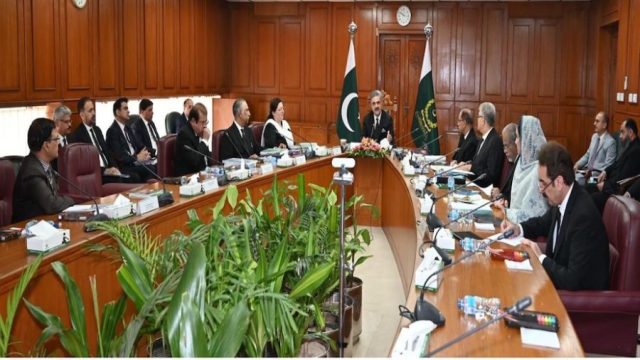ISLAMABAD, Friday, July 11, 2025 (WNP): The National Judicial (Policy Making) Committee (NJPMC) on Friday took serious notice of enforced disappearances across the country, unanimously declaring that the judiciary would not compromise on its constitutional duty to protect fundamental rights.
The strong stance emerged during the NJPMC’s 53rd meeting, chaired by Chief Justice of Pakistan Justice Yahya Afridi at the Supreme Court. The meeting was attended by Chief Justices of all High Courts and the Additional Attorney General for Pakistan, who participated on special invitation.
The committee resolved to formulate a robust institutional response to enforced disappearances. A dedicated body was constituted to develop a coordinated approach, factoring in executive concerns to be conveyed through the Attorney General for Pakistan.
In a comprehensive agenda aimed at modernizing and reforming judicial processes, the NJPMC approved a host of key initiatives, including:
- Commercial Litigation Corridor: Specialized courts and benches to expedite resolution of commercial disputes.
- Double-Docket Court Regime: Piloting in select districts to accelerate case disposal with optional participation.
- Model Criminal Trial Courts: Framework endorsed to address backlog of criminal cases through time-bound trials.
- Court-Annexed Mediation: Launch of pilot project to institutionalize Alternative Dispute Resolution (ADR), including mediation centers at family and district court levels.
To safeguard judicial independence, the Committee instructed High Courts to implement structured mechanisms for reporting and redressing external influence on judicial officers within a defined timeframe.
In a move to enhance performance standards in the district judiciary, a committee led by Justice (Rtd) Rehmat Hussain Jafferi was formed. It will develop Key Performance Indicators (KPIs), propose standardized recruitment and training protocols, and explore international exposure opportunities for judges.
The NJPMC also approved the creation of a Professional Excellence Index to identify and recruit talented lawyers into the judiciary. High Courts were asked to finalize their models within 30 days.
Recognizing the ethical complexities of emerging technologies, the NJPMC directed the National Judicial Automation Committee (NJAC) to finalize a charter governing the ethical use of generative AI in judicial functions.
The committee lauded the Inspector General of Police, Punjab, for a comprehensive presentation on behalf of all provincial IGPs. As a result, SOPs will be issued to enable virtual attendance of under-trial prisoners and official witnesses, while police officers will receive training through judicial academies on request.
Further decisions included:
- All constitutional petitions related to tax and finance will now be heard by division benches instead of single benches in High Courts.
- Support for Lahore High Court’s initiatives such as female bar rooms, day care centers, and health insurance for judges — with recommendations for other provinces to adopt similar measures.
- Proposal for mandatory consultation with presiding officers before transferring staff from administrative courts and tribunals to be taken up with the federal government.
Reaffirming its commitment to a transparent and responsive justice system, the NJPMC reiterated that all reforms must be rooted in constitutional values and the rule of law, ensuring equal and timely access to justice for all citizens.




